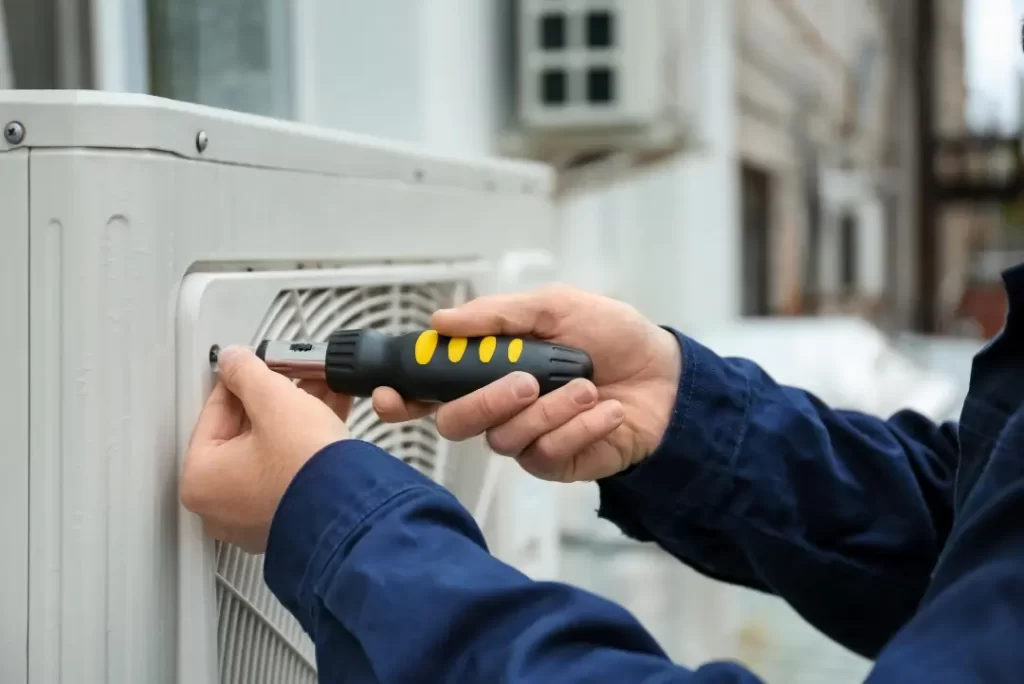Is air conditioning bad for you? Concerns include respiratory problems, allergies, and skin dryness. However, air conditioning also has benefits like better sleep and air quality. This article discusses both the risks and the benefits.
Key Takeaways
- Prolonged exposure to air conditioning can lead to respiratory issues, dehydration, and aggravated allergies, particularly if units are poorly maintained.
- Air conditioning can enhance cognitive performance and improve sleep quality, but excessive use may cause lethargy and fatigue.
- Proper maintenance and optimal temperature settings are essential for maximising the health benefits of air conditioning while minimising its risks.
Health Risks of Air Conditioning
While air conditioning offers relief from hot weather, potential health concerns accompany its use. Extended use of air conditioning can cause health issues like respiratory ailments, headaches, and fatigue. Especially when poorly maintained, air conditioners can spread mould spores and other pollutants, raising the risk of respiratory problems, allergies, and infections.
Additionally, sudden temperature drops over 5 °C, common when transitioning from hot outdoor conditions to cool indoor spaces, can adversely affect the respiratory system. Air conditioning can dry out mucous membranes, making individuals more vulnerable to viruses and bacteria. These factors collectively underscore the potential negative health impacts of air conditioning.

Respiratory Issues
The comfort of air-conditioned environments often comes with a hidden cost: respiratory issues. Spending extended periods in air-conditioned spaces may lead to increased nasal congestion and throat irritation, especially if an oversized air con is installed in the space. Symptoms such as rhinitis, dry throat, and a blocked or runny nose are common among those frequently exposed to air conditioning.
Air conditioners produce dry air that can desiccate mucous membranes, causing respiratory irritation, sore throats, and even nosebleeds. Asthma sufferers may experience bronchoconstriction from continuous exposure to cold air, affecting their ability to adapt to temperature changes.
These symptoms highlight potential health issues linked to prolonged air conditioning exposure.
Dehydration and Dry Skin
Dehydration and dry skin are common health concerns associated with air conditioning. Dry air can cause symptoms like headaches, dry skin, and chapped lips. This effect is especially noticeable during hot weather, when the body loses moisture more rapidly.
Besides causing discomfort, dehydration can lead to serious health issues if ignored. The combination of dry air and extended air conditioning use can worsen skin dryness and irritation, making hydration and moisturizers essential.
Aggravated Allergies and Asthma
Air conditioning can exacerbate allergies and asthma, particularly if units are poorly maintained. Dirty or malfunctioning air conditioners often lead to poor indoor air quality and worsening asthma and allergy symptoms. Mold spores, dust mites, and chemical pollutants spread by air conditioning can trigger allergic reactions and asthma attacks.
Properly maintained air conditioners can improve air quality by filtering out mould and airborne pollutants. Regular inspections and cleaning of air conditioning units are crucial to ensure they enhance rather than compromise indoor air quality.
Cognitive and Physical Effects
Air conditioning affects not only physical health but also cognitive and physical performance. Air conditioning helps regulate indoor temperature, improving comfort and safety, especially for vulnerable populations. Effective use of air conditioning can boost cognitive performance by maintaining a comfortable thermal environment, reducing mental fatigue, and enhancing focus.
Yet, prolonged exposure to air-conditioned environments can result in headaches and fatigue.

Reduced Cognitive Function
During heatwaves, those in non-air-conditioned buildings may suffer cognitive deficits due to higher thermal load and environmental stressors. Studies indicate that individuals in non-air-conditioned spaces often perform worse on cognitive tests than those in air-conditioned environments. Air conditioning reduces mental fatigue and creates a more comfortable environment, leading to better cognitive performance.
However, moving from an air-conditioned environment to outdoor temperatures can increase body stress due to acclimatisation to cooler indoor settings. This underscores the need for balanced air conditioning use to preserve cognitive function without adding stress to the body.
Lethargy and Fatigue
Spending long hours in air-conditioned environments can cause lethargy and fatigue. Extended air conditioning exposure can make individuals feel sluggish and tired, necessitating breaks and outdoor activities to re-energize.
To counter these effects, adjusting environmental factors like varying air conditioning levels and taking regular breaks outside is important. These measures can alleviate tiredness and ensure prolonged air conditioning use doesn’t negatively impact physical well-being.
Positive Health Benefits of Air Conditioning
Air conditioning provides significant health benefits. An indoor temperature between 21 and 25 degrees Celsius is generally most comfortable for sleep and overall comfort. Proper air conditioning helps regulate indoor temperatures, enhancing focus and mental efficiency.
Additionally, air conditioning can improve indoor air quality by reducing harmful pollutants.
Prevention of Heat-Related Illnesses
A key benefit of air conditioning is its role in preventing heat-related illnesses. Keeping indoor environments cool with air conditioning is crucial for protecting at-risk groups like the elderly and young children during heatwaves. The elderly and children are more vulnerable to heat-related illnesses, and air conditioning can prevent serious conditions like heat exhaustion and heatstroke during extreme temperatures.
In hot and humid weather areas, air conditioning helps maintain body temperature, preventing heatstroke and other heat-related health issues. This makes air conditioning indispensable for health and safety during hot summer months.
Improved Sleep Quality
A comfortably regulated room temperature via air conditioning creates an ideal sleeping environment, minimising disruptions from heat. Room temperature is crucial for sleep quality, as the body depends on proper thermal regulation to fall asleep and stay asleep throughout the night.
Air conditioning activates the body’s cooling mechanisms, enhancing sleep by maintaining a consistent and comfortable temperature. Modern air conditioning units are quieter, often featuring night modes that minimise noise disturbances, further enhancing the sleep environment.
Enhanced Indoor Air Quality
Well-maintained air conditioners significantly enhance indoor air quality by trapping and eliminating airborne pollutants, leading to improved air quality. This is particularly beneficial for individuals with allergies and asthma, as systems with advanced filters reduce indoor allergens and improve respiratory health.
Regular maintenance of air conditioning systems is crucial for clean air and maximising health benefits. Regularly checking and changing air conditioner filters prevents harmful pollutant buildup and promotes a healthier indoor environment.
Maintenance and Best Practices
To fully benefit from air conditioning while minimizing health risks, follow best practices for maintenance and usage. Proper maintenance and regular cleaning of air conditioning units can prevent discomfort and health issues.
Professional air conditioning unit maintenance can extend the lifespan of air conditioning units, preventing costly replacements.

Regular HVAC Maintenance
Regular cleaning and maintenance are necessary for air conditioning systems to function properly and offer health benefits. Neglecting air conditioner filters worsens indoor pollution, leading to health issues. Air conditioning filters should be changed frequently to ensure optimal air quality and prevent health problems.
Scheduling maintenance at the start and end of the cooling season is recommended for efficiency and optimal system operation year-round.
Optimal Temperature Settings
Setting air conditioning to the appropriate temperature enhances comfort and health. For sleep, an air-conditioned room set to around 18-21°C can significantly improve sleep quality. The ideal temperature range for restful sleep is 20 to 25 degrees Celsius, maintaining a comfortable sleeping environment.
Maintaining indoor humidity levels between 30 to 50 percent can prevent skin dryness and other issues caused by air conditioning. Staying hydrated and using moisturisers can combat the drying effects of air conditioning.
Engaging professional services for air conditioning installation, maintenance, and repair ensures system efficiency and longevity.
Stay Cool and Healthy with SmartWay Air Conditioning Sydney
At SmartWay Air Conditioning Sydney, we do more than just regulate temperatures; we ensure your home or business is a sanctuary of comfort and wellness. With over 30 years of expertise, our licensed and insured technicians specialise in air conditioning repair, maintenance, and installation services tailored to your unique needs. Whether it’s a quick repair or a complete system upgrade, we deliver dependable solutions that keep your air clean and your environment cozy.
Your health matters to us, which is why we prioritise high-quality work, affordable pricing, and exceptional customer care. With SmartWay, you can enjoy perfectly conditioned air while safeguarding your loved ones from risks like poor air quality and system inefficiencies.
Protect Your Health with Professional Maintenance
Did you know that a poorly maintained air conditioning system can lead to allergies, respiratory issues, and decreased air quality? At SmartWay, we understand the critical role a clean and efficient air conditioner plays in your health. That’s why we offer comprehensive maintenance services to prevent mould, dust buildup, and other harmful pollutants from affecting your indoor air.
Our skilled technicians conduct meticulous inspections and deep cleaning to ensure your system runs smoothly and safely. With regular servicing from SmartWay, you’ll enjoy fresh, pollutant-free air and extend the life of your air conditioning unit, keeping you and your family safe year-round.
Trusted by Thousands Across Sydney
Join over 5,000 satisfied homeowners who trust SmartWay Air Conditioning Sydney for their cooling and heating needs. With a proven track record of excellence, we deliver top-notch services that prioritise your comfort and satisfaction. From installations to emergency repairs, our team is available 24/7 to meet your needs without compromising on quality or affordability.
When you choose SmartWay, you’re not just investing in a service; you’re investing in peace of mind. Let us show you why we’re Sydney’s most trusted name in air conditioning. Contact us today for a free estimate.
Frequently Asked Questions
How can I prevent respiratory issues caused by air conditioning?
To prevent respiratory issues caused by air conditioning, it is essential to regularly clean and maintain the system while frequently changing filters. This practice will enhance air quality and significantly lower the risk of respiratory problems.
What is the ideal temperature setting for air conditioning during sleep?
The ideal temperature setting for air conditioning during sleep is between 20 to 25 degrees Celsius, with a recommended range of 18 to 21 degrees Celsius to enhance sleep quality.
How often should I perform maintenance on my air conditioning unit?
You should perform maintenance on your air conditioning unit at the beginning and end of the cooling season, along with regular cleaning and changing of filters for optimal performance and air quality.
Can air conditioning help with allergies?
Properly maintained air conditioning units can alleviate allergies by trapping airborne pollutants and reducing indoor allergens. Regular maintenance and timely filter changes are essential to ensure optimal effectiveness.
Why is professional maintenance important for air conditioning systems?
Professional maintenance is crucial for air conditioning systems as it enhances efficiency and extends their lifespan. Engaging reputable service providers guarantees that your system remains in optimal condition.
Conclusion
Air conditioning offers both significant health benefits and potential risks. While it can prevent heat-related illnesses, improve sleep quality, and enhance indoor air quality, it also poses risks such as respiratory issues, dehydration, and aggravated allergies if not properly maintained.
By following best practices for maintenance and usage, you can enjoy the comfort of air conditioning while minimising health concerns. Remember, balance is key to maximising the health benefits of your air conditioning system.


